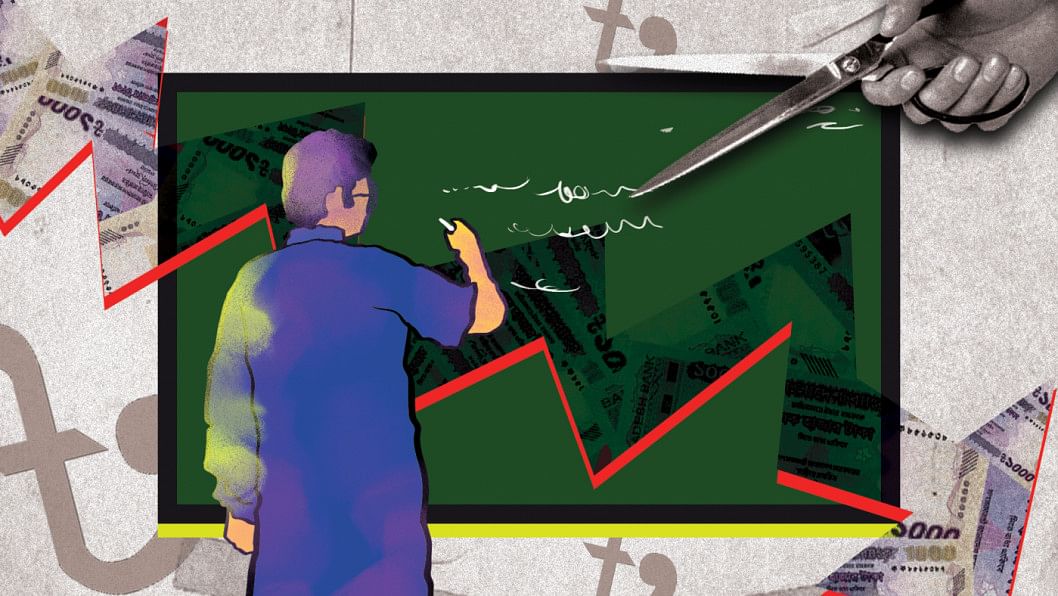Our teachers are underpaid and undervalued

The task of a teacher, an educator, is not an easy one. Not only are they responsible for educating the students, they are expected to be caregivers who provide children with a holistic understanding of how the world works.
Teachers are inherently expected to utilise their own time to plan out lessons, grade papers while keeping track of the progress made (or not) for each student, and even just make themselves available to their students. However, under the burden of all these expectations and accusations of not doing enough, do we truly acknowledge our teachers?
"I started teaching because it intrigued me. I was inspired by my brother-in-law when I was in primary school myself. Being able to use the knowledge I have acquired, and pass that on encouraged me to become a teacher. Having been a teacher since 2004, however, I am not at all satisfied by my income as a teacher," said Md. Shofiqul Islam, English and Civics teacher at KBM High School, Thakurgaon.
The sad reality is that most of our teachers are underpaid and undercompensated. Earlier this year, it was announced that government primary school teachers would be paid according to the 13th grade, with salary ranging from Tk 11,000 to 26,500. Under the same order, trained and untrained headmasters would be paid under the 11th grade.
As for teachers from non-government schools, they are usually offered a salary around or lower than those with MPO (Monthly Pay Order) facilities, subject to the amount of revenue derived from tuitions and other funds.
According to Iqbal Bahar Chowdhury, chairman of Bangladesh Kindergarten, School and College Oikya Parishad, "Most of the salary for non-MPO teachers are derived from the tuition received (which is pretty low itself), after the rent and other utility bills have been paid. During Covid-19, when most parents were either unable to send their children to school or manage connecting online, schools received extremely low funds, causing many teachers were either left with payments below their income level, or were unpaid for months."
Even if we assumed that most teachers were being paid close to, or around the value set by the government, the question remains, is it enough?
In February 2022, the inflation rate was 6.17 percent, which climbed to 6.29 percent in April. Prices of commodities have risen sharply, and the rate at which it has risen, is also increasing, indicating an increase in the cost of living. While these numbers and percentages are often incomprehensible to most people, a recent newspaper article I came across, written by a teacher from Rangunia, Chattogram, aptly expresses that "50,000 is not enough for a family to survive." Most teachers usually make significantly less than that.
When asked about his livelihood as a teacher, Shofiqul shares, "It is simply not enough to run a family, given that there is no support from the government and the amount received as tuition from students is basically negligible. I had to resort to side jobs and businesses. Initially, I would stock up on produce during harvest and resell them a few months later, and now I have a small grocery store next to a fuel station by the road, which allows me to make ends meet."
We also reached out to the principal of a school in Dhaka and asked her to connect us to teachers within her school. Upon requesting anonymity, she denied access to her teachers, conceding that they would all unanimously agree to have been underpaid, which would not reflect well on the institution.
While speaking about the current status quo, Iqbal Bahar Chowdhury adds, "Both MPO and non-MPO teachers are underpaid, but at least there is a guarantee to a pay cheque for government-employed teachers, which other private school teachers don't have. During the pandemic alone, approximately 20,000 private institutions were shut down, and the number of teachers has reduced from approximately 10 lakhs to about 5 to 6 lakhs, as they had either been laid off or they quit after being severely underpaid."
Nazrul Islam Rony, president of Bangladesh Teachers Association, explains, "There is also a significant disparity that exists between the pay and benefits received by government-employed teachers and other civil servants as well. For example, the festival bonus set for teachers receiving MPO facilities was set at 25 percent in January 2004, and has not changed since then. Whereas, other workers employed by the government receive at least 50 percent of their basic, or the entirety, as festival bonus. There are also other benefits like rent discounts and healthcare, which teachers do not receive to the full extent when compared to other workers."
In 2016, it was announced that private tuitions were to be made illegal, and anyone offering private tuition would be convicted. Unfortunately, in a country where jobs are not paying enough and the use of their skills outside of their jobs is made to be illegal, there are very few options and opportunities for teachers.
Shofiqul continues to teach despite the hardships. He says, "Though there has only been a negligible increment in pay over the years, I can still not leave my job. It barely pays for anything, but I have put in about 20 years of my life into this career. Leaving would mean I am letting these years go in vain, and letting go of any benefits I may have received at the end of my career."
Thus, our teachers either remain in the profession and continue to be underpaid; those who leave, forgo the years they have given to this career. Considering the nature of their profession, and the impact their work has on the lives of each and every one of us and society as a whole, it is especially disheartening that it has to stem from a place of sacrifice.
"If we do not pay our teachers what they deserve, we can neither expect the quality of our education to improve, nor can we expect any structural modifications to be carried out properly," urges Nazrul.
Whenever the quality of our education comes into question, directly or indirectly, the role of teachers is called into question. While teachers are not the only determinants of reform that our education system requires, they are crucial in making any change possible. However, the current levels of remuneration and incentives for teachers do not align with the expectation of greater effort.
"One of the last options appears to be teaching at the school level for college graduates in Bangladesh," states a report published by CAMPE and CPD in June 2016. As unfortunate as that may sound, it makes sense for college graduates to choose other professions that offer greater monetary incentives.
If we continue to brush off the impact of underappreciating and undervaluing our teachers and the efforts they put in, we must also be prepared to deal with the consequences where there may be no change to the quality of education, and a future generation where there are not enough teachers to educate the students.
Reference
Khan, T., Rahman, M., & Sabbih, M. (2016). Education Budget in Bangladesh: An analysis of trends, gaps and priorities.
Syeda Afrin Tarannum is a sub-editor at SHOUT. Reach her at [email protected]

 For all latest news, follow The Daily Star's Google News channel.
For all latest news, follow The Daily Star's Google News channel. 





Comments